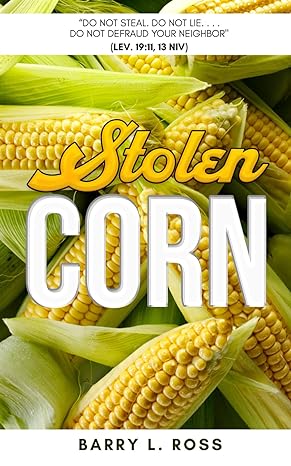With STOLEN CORN, Barry L. Ross explores a collection of biblical passages, offering readers a potent mix of interpretation, explanation, and personal reflections. Ross’s examination encourages a deeper understanding of God’s words and their relevance in daily life. Each chapter is designed to challenge the spiritual and ethical perspectives of modern-day believers, prompting them to reflect on their relationships and daily decisions in light of biblical teachings.
The template for Ross’s collection is established with the opening chapter, “Stolen Corn,” which begins with a passage from Leviticus: “‘Do not steal. Do not lie. Do not deceive one another. . . .Do not defraud or rob your neighbor.’” Ross then shares a story from his youth about how he and his older brother once stole corn from a local farmer’s field, resulting in guilt and fear of retribution. They eventually confessed and made amends, learning a valuable lesson about honesty and forgiveness that has resonated throughout their lives. The chapter concludes with a short prayer that doubles as a reflective summary of the previous chapter.
From there, Ross balances personal anecdotes (such as his path to Christian ministry in Chapter Four) with in-depth, albeit relatable analysis. An ordained minister (in The Wesleyan Church), Ross approaches each biblical passage with a discerning eye and an air of reverence. His decades of ministry education at the college level shine through in his ability to transform virtually any biblical passage into an applicable lesson. For instance, on the surface, “Rahab the Prostitute” (from Joshua 6) highlights the unexpected mercy shown to the quick-thinking Rahab, a lowly prostitute who plays a crucial role in the Israelite spies’ mission in Jericho. Still, despite the Old Testament setting, Ross succeeds at offering a modern-day parallel: “One day, a student came to my office for academic counsel…As she revealed her story, I was amazed and humbled. She had once been a derelict in the slums of a large city, a person that others who passed by pitied, but avoided. Society had given up on her.” Not unlike Rahab, God’s redemption shined through the woman in Ross’s story.
At little over a hundred pages, STOLEN CORN is surprisingly concise, especially considering the treasure trove of insight it offers. In fact, the collection’s brevity may be the only notable gripe for readers looking for something a bit more comprehensive. On the other hand, with each chapter averaging only a few pages in length, STOLEN CORN may be perfectly suited for the modern, “over-scheduled” reader with only minutes to spare each day. It should also be noted that STOLEN CORN primarily focuses on the Old Testament, something that makes sense when considering that Ross “specialized in Old Testament and Biblical Hebrew.” Still, when Ross tackles the Book of Matthew (via the final three chapters), the results are nonetheless compelling and insightful. Here’s hoping a second volume is in the works.
In STOLEN CORN, Barry L. Ross delivers a concise yet insightful collection of biblical passages, personal anecdotes, and modern-day parallels that encourage readers to reflect on their spiritual and ethical perspectives in light of God’s word.
~James Weiskittel for IndieReader

